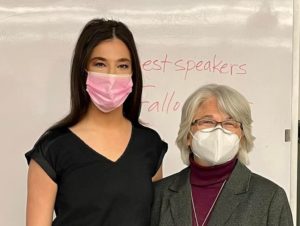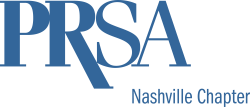“Thank you for being a friend.” As we remember the life and work of entertainer Betty White (1922-2021), those words from the theme song for “The Golden Girls” come to mind. The popular sitcom aired on NBC from 1985-92 and is still watched on several streaming services. Appealing to audiences of all ages, the show featured four mature widowed/divorced women sharing a house in Miami. The characters known as Rose Nyland, Dorothy Zbornak, Blanche Devereaux and Sophia Petrilo had individual interests and often disagreed, but they shared good humor and friendship. Their domestic adventures portrayed some of the comfort and blessings of having friends.
Merriam-Webster defines friend as “one attached to another by affection or esteem,” and “one that favors or promotes something.”
In the past year, it was my pleasure to make a new friend through PRSA Nashville’s Mentorship Program, coordinated by the chapter’s Young Professionals Committee. An email in May, from YP Committee chairs Amy Dalton and Andrea Lindsey, invited PRSA Nashville members to apply for the program, and I responded. Interested members with less than eight years of experience were matched with interested “seasoned PR pros” (members with eight of more years of PR experience). Mentors and mentees would be asked to meet monthly between May and December.
Subsequent emails connected me with Fallon Acker, an assistant account at MP&F Strategic Communications, and we met initially via Zoom. I was delighted to learn that Fallon is already active in PRSA Nashville, serving on the program committee in 2021 and chairing the committee in 2022. Our lively intergenerational conversations included topics such as industry trends, professional experience, education issues, diversity and inclusion, marketing research, and university studies/co-curricular activities. Her perspective — as a young professional — on the benefits of PRSSA for students was valuable to me, as the faculty adviser for a university PRSSA Chapter. She also shared interesting ideas on consumer research.
Her professional background, I learned, includes experience in sport communications, which is an interest area for several public relations majors in my classes at Belmont University. I wondered if she would she be willing to visit my Public Relations Writing class to discuss career experiences and advice from a young pro. Not only did she agree to meet with us on campus, she also recruited her colleague Ian Dinkins to join her. My students had many questions for our two guest speakers. “What is the most important lesson you took away from your time in school? How often do you use AP style? What do some of the day-to-day responsibilities in your job look like?”
Our PRSSA Chapter has a GROW Mentorship Program, and when I asked Fallon to be matched as a mentor to one of our senior public relations majors, she readily agreed. From my perspective, the PRSA Nashville Mentorship Program provided a beneficial connection, and I heartily recommend it.
Reflecting on friendship and mentorship, I am reminded of some of the ideas advanced by Gallup researcher Tom Rath. Friends serve different roles in our lives, he wrote, and no friend could fill all of these roles. His book Vital Friends: The People You Can’t Afford to Live Without (2006) is one of my favorites. He describes eight distinct roles filled by various friends:
- Builder
- Champion
- Collaborator
- Companion
- Connector
- Energizer
- Mind Opener
- Navigator
Champions, for example, stand up for you and for what you believe in. They are the friends who sing your praises.
To strengthen relationships with your Champion friends, Rath said, tell them precisely what you want them to communicate to others about your abilities, interests, successes, goals and aspirations. Let them know when their kind words, comments and compliments find their way back to you. Quietly let them know about your accomplishments.
To be a better Champion friend, said Rath, ask your friends about their accomplishments. Check in regularly with your friends and ask what successes they have had at work or at home.
Rath provides helpful suggestions on how to be better in the other roles of friendship, as well.
- Builders are great motivators, always pushing you toward the finish line. To be a better Builder friend, make time to visit with your friends. Help them take pride in themselves by owning what makes them unique and special.
- Collaborators are friends with similar interests – the basis for many friendships. To be a better Collaborator friend, make time to share stories and reminisce. Schedule a regular day to eat lunch or dinner together.
- Companions are always there for you, whatever the circumstances. You share a bond that is virtually unbreakable. To be a better Companion friend, when your friends are going through a hard time, be there for them. Try to not keep secrets from your friends. Work through any conflicts as quickly as possible. Tell your friends how much they mean to you.
- Connectors are bridge builders who helps you get what you want. Connectors get to know you – and then introduce you to others. To be a better Connector friend, let friends know they can use you as a resource to get the right information or to the right people for the things they need. Invite your friends to social engagements or events that they might not typically attend. Think of people it would be advantageous for your friends to meet.
- Energizers are your “fun friends” who always give you a boost. You have more positive moments when you are with these friends. To be a better Energizer friend, call or email your friends with jokes or funny anecdotes that will make them laugh. Help your friends take a mini-vacation without leaving town – invite them to a movie, lunch or other activity where you can unwind and enjoy life.
- Mind Openers are the friends who expand your horizons and encourage you to embrace new ideas, opportunities, cultures, and people. They challenge you to think in innovative ways and help you to create positive change. To be a better Mind Opener friend, help your friends ask questions. Listen to your friends’ thoughts and ideas. Invite your friends to events or educational opportunities that they might not pursue on their own.
- Navigators are the friends who give you advice and keep you headed in the right direction. You go to them when you need guidance, and they talk through the pros and cons until you find an answer. To be a better Navigator friend, help your friends focus on the big picture. Make time to listen as a sounding board and provide guidance. Help your friends think about possible outcomes and uncover the best decision. When they’ve made important decisions, look for ways to celebrate.
In Rath’s most recent book, Life’s Great Question: Discover How You Contribute to the World (2020), he urges us to shape our identities less about what we do and more about “How can I contribute?”
One way we can contribute is by making and strengthening our connections. Resolved for 2022: Be a friend.


Bonnie Riechert, Ph.D., APR, Fellow PRSA, is a faculty member and former chair in the Department of Public Relations at Belmont University. She can be reached at [email protected]
